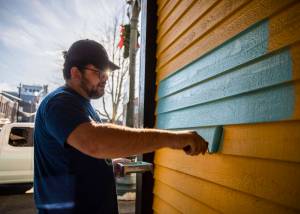Jail population drops as justice is postponed by COVID-19
Published 1:30 am Sunday, March 22, 2020


EVERETT — In normal times, it may seem irrelevant to point out that the inmate seated at the defense table — accused of threatening to kill his girlfriend and throwing a shoe at her face — has been diagnosed with asthma.
Yet that’s why the Everett man, 21, was in court Wednesday, asking a judge for his release from the Snohomish County Jail.
Keeping him behind bars could be a death sentence, if the virus causing COVID-19 finds its way inside the jail walls.
Some inmates in Snohomish County have been tested for the highly contagious new coronavirus, though the exact number hasn’t been released. As of late last week, none of those tests came back positive.
Like most everything else in the era of the new coronavirus, bail hearings had a different feel and tone last week in Snohomish County, as judges heard from defense attorneys arguing their clients were at risk of serious illness or death, if they continued to be confined.
The inmate population in Snohomish County’s jail has dipped at least 30 percent over the past two weeks, from about 800 to 560. It’s a result of fewer people being accepted by the jail on nonviolent and misdemeanor charges; new emergency policy changes at the prosecutor’s office and in the courts at large; and persuasive arguments from defense lawyers, advocating for the release of defendants who are at high risk to die if infected.
Most people in the county jail are awaiting trial and presumed innocent.
Laura Martin, an attorney with the county’s Public Defender Association, argued Wednesday on behalf of the Everett man, who was charged with a single count of felony harassment. He had no prior felony record. He has been in jail since Feb. 2. The virus is so new it would be difficult to say what effect it could have on him.
“We don’t know,” Martin said. “That’s the problem.”
In a motion to the court, she noted the man has suffered from asthma since childhood, had been hospitalized due to breathing issues, and is supposed to get injections every week or so.
“If the setting of bail is not the time to hold a defendant accountable for the crime of which they have been accused,” Martin wrote, “then surely it is not the time to require some of the medically vulnerable and highest risk among us to face this threat with no possibility of reasonable measures to prevent themselves from exposure.”
Unprecedented times
The Eighth Amendment is just 16 words long. It’s best known for its prohibition on “cruel and unusual punishments,” but its opening words are, “Excessive bail shall not be required.”
Judges decide what’s excessive and what’s fair.
Our bail system poses hotly debated legal and ethical questions, even when we’re not staring down a global pandemic. In Snohomish County, it’s seeing a case-by-case re-examination, urgently, with an impending tsunami of coronavirus cases predicted in the coming days and weeks.
As of Saturday, the pandemic had caused at least 85 deaths in the state and sickened more than 1,580 people. Schools, bars, gyms and other public places have been ordered to close statewide, and the governor has asked Washingtonians to practice “social distancing” — standing 6 feet apart from strangers and avoiding crowds.
In Italy, where the virus began its exponential spread just days earlier than in the United States, hospitals were stretched to their limits, soldiers were being drafted to enforce a national lockdown, and on Saturday the country announced 793 new deaths.
“These are unprecedented times,” Judge Paul Thompson said, sighing twice mid-sentence, at the bail hearing of another man charged with making racist threats against two workers at a Walmart.
All month, Snohomish County Superior Court Presiding Judge Bruce Weiss has been issuing emergency orders in response to the virus: barring anyone with signs of illness from entering courtrooms; waiving hearings for out-of-custody defendants; and delaying all criminal and civil jury trials in Superior Court.
Meanwhile, the Snohomish County Prosecutor’s Office has adopted a temporary policy of agreeing to release inmates held on nonviolent and nonsexual offenses, if that defendant …
• has compromised health, as determined by jail medical staff;
• is in the high-risk group due to age;
• is charged with a misdemeanor or gross misdemeanor that is not a DUI or related to domestic violence;
• is charged with simple possession of a controlled substance and has “limited prior felony charges;”
• would be eligible for an alternative justice program.
Attorneys have focused on the low-hanging fruit first — cases where an inmate is held on a relatively minor charge, with a documented medical record — and are now moving up the tree.
Prosecutors have resisted lower bail or release when records are not available, and that has been frustrating in cases where vulnerable clients never had good medical care in the first place, said Kathleen Kyle, director of the county Public Defender Association.
According to one U.S. Department of Justice study, about half of all jail inmates live with a chronic health condition, and an estimated 10 percent of jail inmates have asthma.
A fraction of inmates face long prison sentences, but almost all will be rejoining society one day, and for the vast majority it will be sooner rather than later.
“Let’s figure out their punishment … after this crisis,” Kyle said.
On Wednesday, the state Supreme Court ordered almost all civil and criminal cases to be put on pause statewide until April 24. The order was proposed in a group effort by the the Washington Association of Criminal Defense Lawyers, the Washington Defender Association and a new Washington Association of Prosecuting Attorneys committee addressing COVID-19. It was formally submitted by Snohomish County Prosecutor Adam Cornell and King County defense attorney Amy Muth.
Under the order, courts are advised to prioritize court dates, such as bail hearings, that could lead to an inmate’s release in the next 30 days.
Epidemiologists project we’re weeks away from the worst of the outbreak in the U.S., and rapid massive societal changes would be needed to “flatten the curve” of the incoming wave.
In the jailhouse now
Since the start of the year, about 55 new inmates were being booked into the Snohomish County Jail each day. In late February, the jail saw single days with 74, 75 or 80 people newly behind bars.
Among them were arrests for relatively minor offenses: possession of drug paraphernalia, trespassing and vehicle prowling.
A marked decline in bookings began March 6, as the COVID-19 death toll mounted at a Kirkland nursing home, according to data provided by the jail. Only 27 new bookings were made on March 8, and the daily average dropped to 36½.
Arrested suspects are now being screened for coronavirus in a 20-by-20-foot tent outside of the county jail’s general population. If someone has the symptoms — a fever, for example — they may be taken to a hospital, where they must receive medical clearance to be booked.
Screening can’t catch everything, though. People infected with the virus can appear asymptomatic, then show symptoms days later, like the man in Everett who became the first confirmed COVID-19 patient in the United States. In and outside of the jail, a lack of available testing for the new coronavirus has stoked fears.
For the foreseeable future, the Snohomish County Sheriff’s Office has imposed restrictions on what leads to a jail booking, to reduce the number of inmates. The exact guidelines weren’t made public, but certain serious crimes still require a mandatory booking: sex offenses, violent offenses, domestic violence and DUI.
Any inmate being tested for COVID-19 may be housed in a negative pressure cell, and whole housing units can be converted into negative pressure, if needed. Volunteer group gatherings have been restricted, and the jail reception hall was closed to the public.
Meanwhile, inmates have remained locked in their cells for longer hours — “22 hours a day, at best,” said Kyle, the public defender — and that’s especially straining for many prisoners who have mental health conditions. Cleaning supplies such as spray bottles and sponges have long been considered contraband.
Hours at the main sheriff’s office lobby were restricted last week, while other precinct offices were closed to the public entirely. Everett police and other neighboring departments have closed their lobbies, too.
Outside of the local justice system, at least three employees of the state Department of Corrections tested positive for COVID-19 this month, at different workplaces. One is an employee at the Monroe Correctional Complex who last worked March 8.
So far no incarcerated people in state prisons have tested positive.
All prisons stopped allowing visitors earlier this month, and on Friday, the DOC announced a new policy that will allow prisoners up to two free phone calls per week, up to five minutes each. Inmates, family and others may also pay for phone or video calls.
In downtown Everett, the sheriff’s office has been working with the Snohomish Health District to keep the virus out of the jail.
An outbreak there could pose a far-reaching safety risk, wrote the defense attorney for the Everett man with asthma, in a motion to Judge Thompson.
“Here,” Martin wrote, “the government’s interest in ongoing incarceration is much reduced where that incarceration itself will create an unsafe health condition for the community by creating a hotbed for disease contagion to be spread to the community.”
Martin wrote that, while she did not want to disparage medical staff at the jail, they are “limited in their capacity to treat emergent cases and the custodial guards have no reasonable measures they can take to effectively distance themselves from the inmates in the jail.”
Judge Thompson accepted Martin’s argument but did not grant release on a mere promise to show up to court. He reduced bail from $20,000 to $2,500, citing the man’s medical condition, and ordered no contact with the victim, as is typical in a case like this.
Three days later, on Saturday, the man remained behind bars.
Caleb Hutton: 425-339-3454; chutton@heraldnet.com. Twitter: @snocaleb.






